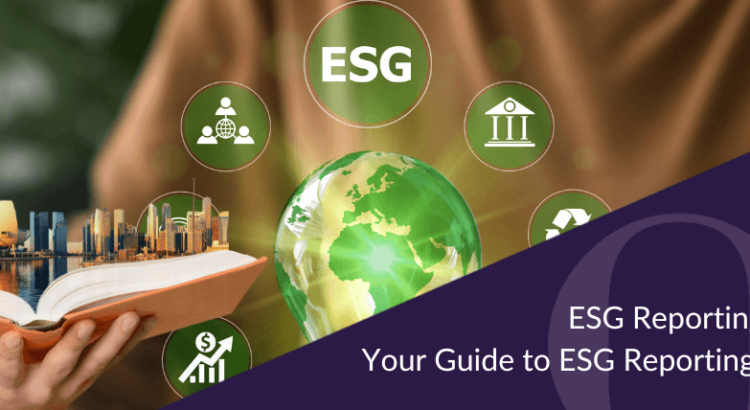| ||||||||||||||||||||||||||||||||||||||
| ||||||||||||||||||||||||||||||||||||||
|


| ||||||||||||||||||||||||||||||||||||||
| ||||||||||||||||||||||||||||||||||||||
|

In Singapore, ESG reporting is rapidly becoming a norm amongst businesses, driven by heightened investor and consumer interest in sustainability and ethical practices. For listed companies, the Singapore Exchange (SGX) introduced a phased approach to mandatory climate reporting on a ‘comply or explain’ basis, based on the recommendations of the Task Force on Climate-related Financial Disclosures (“TCFD”). From 2027 fiscal year, large non-listed companies with annual revenue of at least SGD 1 billion and total assets of at least SGD 500 million will be required to make climate disclosures.
Besides regulatory requirements, ESG reports are increasingly influential in guiding decisions, fostering positive transformations, mitigating avoidable risks, and enhancing trust and transparency. In this article, we explore the basics of ESG reporting, its importance, different frameworks, and best practices for successful implementation.
Environmental, Social, and Governance (ESG) serves as a framework extensively employed to assess the sustainability and ethical footprint of a company’s operations and policies. It includes criteria that investors, stakeholders, and organisations examine when evaluating and disclosing a company’s non-financial performance. ESG elements offer a comprehensive perspective for assessing companies, focusing on their environmental impact, social contributions, and governance standards within the community.
ESG reporting involves transparently sharing standardised details about a company’s sustainability initiatives, objectives, and advancements to underscore its dedication to ethical business conduct. This enables stakeholders to understand the extent of a company’s sustainability efforts.
Operating within the ESG framework, sustainability reporting enables companies to highlight their endeavours in tackling environmental issues, fostering social accountability, and instating effective governance measures. It serves as a channel for companies to communicate their sustainability strategies, objectives, and achievements to investors, clientele, workforce, and the broader community.

Although ESG and sustainability share overarching objectives, they diverge in their reporting approaches.
ESG reporting entails a set of criteria used by investors, stakeholders, and organisations to assess a company’s non-financial performance. It evaluates a company’s environmental, social, and governance practices and their implications for long-term sustainability and risk management. Factors such as climate change initiatives, employee relations, board composition, executive compensation, and risk mitigation strategies are examined.
On the other hand, sustainability reporting takes a comprehensive approach, considering the long-term sustainability of the planet, society, and economy. It aims to meet current needs while ensuring future generations can meet their own. This involves evaluating businesses’ impacts on the environment and implementing strategies to enhance resilience, resource efficiency, and social progress.
Prioritising ESG reporting holds significance for organisations in Singapore, as it can enhance corporate reputation and help mitigate potential risks. In 2016, the Singapore Exchange (SGX) introduced the Sustainability Reporting Guide, making it mandatory for all listed companies to disclose their sustainability practices on a ‘comply or explain’ basis.

Industries in Singapore have increasingly adopted diverse ESG frameworks in recent years. These are some of the prevalent reporting frameworks.
GRI is a globally acknowledged reporting framework that offers guidelines for organisations to report their economic, environmental, and social impacts. It provides a comprehensive range of indicators and metrics enabling organisations to gauge and disclose their ESG performance. In Singapore, many companies leverage the GRI framework to compile their sustainability reports, enhancing their credibility and enabling comparisons.
Another notable framework is SASB, which offers industry-specific guidelines for reporting financially significant ESG information. The SASB standards are customised to each sector, concentrating on the ESG matters most important to them. By following SASB standards, organisations in Singapore can customise their ESG reporting to suit their industry’s requirements and fulfil the expectations of investors and stakeholders.
The TCFD framework has garnered attention in Singapore as well. It provides a framework for organisations to evaluate and reveal climate-related risks and opportunities. It prompts companies to disclose details concerning governance, strategy, risk management, and metrics and targets on climate change. Employing ESG reporting in this manner allows organisations to showcase their readiness for climate risks and their efforts to transition toward a low-carbon economy.

In ESG reporting, it’s crucial to adhere to certain principles when sharing insights with stakeholders.
Navigating the complexities of ESG reporting demands precise data collection, reporting, and analysis. BoardRoom’s ESG Access offers a comprehensive software solution tailored to simplify sustainability reporting for companies in Singapore.
ESG Access presents an array of tools that streamline data requests, response collection, and evidence gathering, ensuring seamless access and collaboration to essential information. The software incorporates functionalities for reviewing, validating, and auditing, empowering stakeholders to contribute, review, and endorse reporting timelines, all within a unified platform. Entity reporting allows you to easily organise users into groups (entities) and control/assign ESG metrics specific to each group, so you can improve decision making, identify growth opportunities and manage group risks. Additionally, it allows you to craft and personalise your sustainability reporting to align with the specific requirements of your stakeholders.
SMEs in Singapore can leverage the Enterprise Development Grant (EDG) to offset costs associated with ESG services provided by BoardRoom. This grant enhances accessibility and affordability for SMEs seeking to improve their sustainability practices while complying with ESG reporting standards.
Get a free 7-day trial on our ESG Access reporting software now.

08 Jul 2024
Learn to navigate corporate tax filing in Singapore effectively and ensure timely, compliant submissions with our c …
READ MORE
14 Jun 2024
Explore the essentials of XBRL filing in Singapore, covering mandatory requirements, benefits, preparation steps, a …
READ MORE
11 Jun 2024
Corporate governance goes beyond compliance, shaping the fabric of an organisation. Discover the corporate governan …
READ MORE
In today’s business landscape, Environmental, Social, and Governance (ESG) considerations are gaining importance among investors and consumers in Singapore. Conducting due diligence in ESG is essential for informed decision-making, fostering sustainable practices, and enhancing transparency and trust. Explore the significance of ESG due diligence and its impact on corporate reputation, financial outcomes, and capital access. Gain valuable insights into ESG principles, the due diligence process, and the common challenges encountered by organisations in Singapore.
ESG, which stands for Environmental, Social, and Governance, represents a comprehensive evaluation framework for assessing a company’s performance across these three dimensions:
Due diligence in ESG entails a comprehensive investigation and assessment of a company’s strategies and policies in these domains. This includes scrutinising the company’s impact on the environment, society, and stakeholders, along with its governance and ethical framework.
In the process of ESG due diligence, investors and businesses in Singapore analyse various aspects, including the company’s environmental footprint, waste management strategies, treatment and diversity of employees, customer safety and satisfaction, community involvement, board composition, executive compensation structure, and adherence to ethical business norms. Through this thorough examination, stakeholders determine whether the company aligns with established ESG standards and principles.
Conducting due diligence for ESG purposes involves a structured process comprising five key steps:
Clearly outline the priorities and criteria crucial to your organisation, covering environmental impact, social responsibility, and corporate governance. These benchmarks will shape your investigative direction.
Acquire comprehensive data on ESG performance, such as environmental footprint, labour standards, board diversity, and disclosure practices. Utilise diverse sources such as public disclosures, corporate reports, and third-party assessments for a well-rounded evaluation.
Analyse the collected data and consider the potential risks and implications associated with ESG practices.
Foster direct engagement with stakeholders to gain deeper insights into the company’s operations and policies. This interactive process facilitates inquiries and addresses concerns effectively.
Evaluate the company’s ESG practices based on industry standards and regulatory mandates. Document your findings and disseminate them to relevant stakeholders, including investors and shareholders. By sharing insights, you foster transparency, accountability and facilitate potential positive transformations within the organisation.

Thoroughly examining a company’s environmental, social, and governance practices is essential for aligning with ESG standards and principles. This approach enables stakeholders to make decisions that embrace not only financial gains but also the company’s sustainability and ethical footprint. Identifying potential environmental, social, or governance concerns empowers investors and businesses to make informed and prudent choices, preventing potential financial and reputation-related risks.
By meticulously documenting findings, stakeholders can hold companies accountable for their impact on the environment, society, and governance. This accountability encourages companies to adopt more sustainable and ethical approaches. This accelerates a ripple effect where companies strive to enhance their ESG standings, fostering a more sustainable and ethical business environment.
By disseminating findings to relevant stakeholders, including investors, shareholders, and the company itself, there’s enhanced transparency and accountability regarding ESG practices. This promotes trust among stakeholders and bolsters the company’s reputation as a responsible corporate citizen.
In Singapore, companies are bound by various laws and regulations, such as the Environmental Protection and Management Act and the Companies Act, which mandate transparency and disclosure of ESG practices. Non-compliance can lead to legal consequences and tarnished reputations for companies.

While conducting due diligence for ESG is imperative for businesses, several challenges may arise during the process:

Conducting ESG due diligence presents challenges, especially in precise data collection, reporting, and analysis. BoardRoom’s team of experienced ESG professionals have the expertise in multiple APAC jurisdictions to help you help you develop and implement a tailor-made ESG strategy for your business, supporting ongoing sustainability and profitability as a result.
Our ESG advisory service includes helping you identify relevant ESG risks and opportunities, setting ESG targets, creating sustainability reports, conducting a materiality assessment, drafting a sustainability policy for your company and ESG due diligence.
Contact us for a consultation now.

08 Jul 2024
Learn to navigate corporate tax filing in Singapore effectively and ensure timely, compliant submissions with our c …
READ MORE
14 Jun 2024
Explore the essentials of XBRL filing in Singapore, covering mandatory requirements, benefits, preparation steps, a …
READ MORE
11 Jun 2024
Corporate governance goes beyond compliance, shaping the fabric of an organisation. Discover the corporate governan …
READ MORE
| |||||||
| |||||||
| |||||||
| |||||||
| |||||||
| |||||||
| |||||||
| |||||||
|

Performance Share Plans (PSP) serve as a strategic tool for companies aiming to align employee performance with organisational success. This comprehensive incentive program grants employees shares based on predetermined performance criteria.
In this guide to Performance Share Plans, we explore the various aspects of this incentive structure. From understanding its core functionality to navigating the diverse benefits it offers, we provide insights into the establishment requirements, tax implications, and associated risks.
A Performance Share Plan (PSP) is an executive compensation strategy that aligns the interests of company leaders with overall organisational success. In a PSP, executives receive awards in the form of shares, and these awards are contingent on achieving predefined performance targets. The performance is typically measured against specific financial, operational, or strategic metrics. As executives meet or exceed these goals, they unlock shares, creating a direct link between their performance and financial rewards.

Performance Share Plans (PSPs) offer several benefits. They serve as strong incentives by directly tying executive rewards to the company’s performance, motivating executives to contribute to overall success. PSPs also encourage a focus on long-term goals, fostering sustained achievements. Moreover, they help retain talent by giving executives a stake in the company’s success, reducing turnover. These plans provide a clear and measurable way to evaluate executive performance, creating a results-driven culture. In essence, implementing PSPs strategically enhances organisational performance and strengthens the connection between executive leadership and corporate success.
Performance Shares come in various types, offering flexibility for companies to tailor incentive structures to their specific needs.
Here are some common types of Performance Shares:

Establishing a Performance Share Plan in Singapore involves a comprehensive approach. Firstly, in the design phase, clear objectives must be defined, aligning them with the company’s overarching goals. Additionally, specifying performance metrics that determine share or cash allocations is crucial. Legal and regulatory compliance is vital, requiring adherence to regulations set by the Accounting and Corporate Regulatory Authority (ACRA) and the Monetary Authority of Singapore (MAS).
Transparent communication with employees is essential, detailing the criteria for earning shares, the potential value of the awards, and clarity on vesting schedules and conditions. Employee eligibility is determined based on factors like job level, performance, and tenure, and the plan’s scope may include all employees or specific groups. Establishing performance metrics involves outlining key indicators relevant to the company’s objectives. Defining a vesting period with a graded approach encourages employee retention. Valuation methods for PSP awards, whether in shares or cash equivalents, need to be consistent and fair.
Efficient administration and record-keeping systems, potentially utilising specialised software are essential. Understanding tax implications for both the company and employees is important, involving consultation with tax professionals for compliance with Singapore’s tax laws. Obtaining board approval aligning with the company’s overall compensation strategy is the final step, ensuring the success of the PSP in motivating employees and aligning their interests with the company’s performance. Consulting legal, financial, and HR professionals is advisable throughout the design and implementation phases to ensure a seamless process.
Explore our comprehensive ESOP platform that simplifies the management and administration of your Performance Share Plan (PSP).

The tax treatment of a Performance Share Plan (PSP) varies by locations and design features, with key considerations:
Implementing a Performance Share Plan (PSP) comes with certain restrictions and risks that require careful consideration:
The value of performance shares can decrease. The value of performance shares is often tied to the company’s stock price or other predetermined performance metrics. If the company’s stock price declines or if the predetermined performance goals are not met, the value of the performance shares can decrease. This is a risk associated with performance-based compensation plans, as the value is contingent on the company’s overall performance.
Yes, there are tax implications for receiving performance shares. The taxation of performance shares can vary based on the jurisdiction and specific tax regulations. In many cases, taxation occurs when the performance shares vest or when the recipient sells the shares. In some jurisdictions, the value of the performance shares at the time of vesting may be treated as ordinary income, subject to income tax.
PSP in Singapore can be customised for different employees. Companies often tailor PSPs to align with their organisational goals, individual roles, and employee preferences. Customisation may involve varying performance metrics, vesting periods, or the number of shares granted based on factors such as seniority, job responsibilities, or performance expectations.

08 Jul 2024
Learn to navigate corporate tax filing in Singapore effectively and ensure timely, compliant submissions with our c …
READ MORE
14 Jun 2024
Explore the essentials of XBRL filing in Singapore, covering mandatory requirements, benefits, preparation steps, a …
READ MORE
11 Jun 2024
Corporate governance goes beyond compliance, shaping the fabric of an organisation. Discover the corporate governan …
READ MORE
| |||||||||||||||||||||||||||||||||||||||
| |||||||||||||||||||||||||||||||||||||||
|